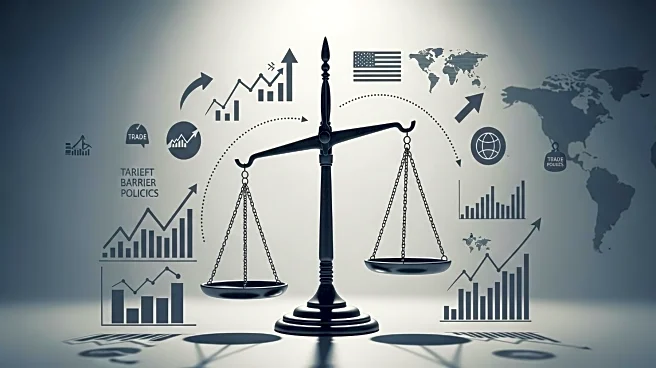What's Happening?
The U.S. labor market is showing signs of significant weakening, with only 22,000 jobs added in August, far below the expected 75,000. This marks a continuation of a downward trend in job growth, which has been affected by President Trump's economic policies, including tariffs and immigration crackdowns. The unemployment rate has risen to 4.3%, the highest since 2021. The construction industry lost 7,000 jobs, and manufacturing has shed 38,000 jobs this year, partly due to tariffs on imported materials. The federal government also cut 15,000 jobs last month. The job market's slowdown is attributed to multiple factors, including the Federal Reserve's interest rate hikes and the impact of artificial intelligence on entry-level positions.
Why It's Important?
The weakening labor market has significant implications for the U.S. economy, which relies heavily on consumer spending. With job growth stalling, consumer confidence may decline, potentially leading to reduced spending and investment. The tariffs imposed by President Trump are affecting businesses that depend on foreign suppliers, leading to increased costs and layoffs. The construction and manufacturing sectors are particularly vulnerable, impacting overall economic activity. The rise in unemployment and the slow job creation rate could lead to a harder economic landing, affecting millions of Americans. Additionally, the Federal Reserve may be compelled to cut interest rates to stimulate economic growth, which could have long-term effects on inflation and borrowing costs.
What's Next?
The Federal Reserve is expected to cut its benchmark interest rate at its upcoming meeting, which could provide some relief to the economy by lowering borrowing costs. However, the impact of Trump's tariffs and immigration policies may continue to weigh on job growth. The aging population and reduced immigration are likely to further constrain the labor supply. Economists are also concerned about the role of artificial intelligence in displacing young workers, which could exacerbate unemployment rates. Political leaders and businesses may need to address these challenges to prevent further deterioration of the labor market.
Beyond the Headlines
The current economic situation raises ethical and policy questions about the balance between protectionist policies and their impact on domestic industries and workers. The reliance on tariffs as a tool for economic protection has led to unintended consequences, such as increased costs for businesses and job losses. The integration of artificial intelligence into the workforce poses challenges for young workers, highlighting the need for policies that support workforce adaptation and retraining. The broader implications of these developments may include shifts in political priorities and public policy debates regarding economic strategy and labor market interventions.










